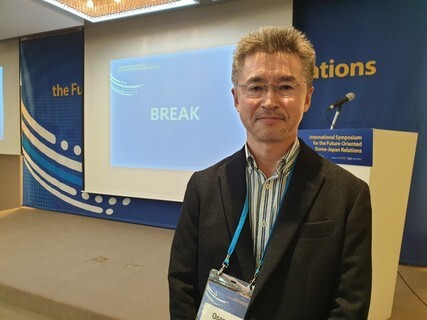hankyoreh
Links to other country sites 다른 나라 사이트 링크
Japanese historian criticizes Tokyo’s rejection of S. Korea’s Supreme Court ruling on forced labor

“It’s wrong for the Japanese government to denounce the South Korean Supreme Court ruling ordering compensation for forced labor mobilization as a ‘violation of international law.’ This is a reckless response that uses the prestige of the term ‘international law’ to obscure the gist of the Supreme Court’s judgment.”
Osamu Ota, a Japanese historian and professor at Doshisha University who majored in contemporary Korean history, criticized Tokyo’s response to the South Korean Supreme Court’s forced labor mobilization ruling on Dec. 10 while attending an international symposium on “Envisioning Peace in East Asia from the Chasm of South Korea-Japan Historical Conflict” at the President Hotel in Seoul. The symposium that day was sponsored by the National Research Council for Economics, Humanities and Social Sciences (NRC) and organized by the Korea Legislation Research Institute (KLRI) and the Seoul National University Institute for Japanese Studies.
Stressing that the “South Korean Supreme Court ruling does not repudiate the 1965 South Korea-Japan Claims Settlement Agreement,” Ota explained, “It recognized the Claims Settlement Agreement, and then concluded that the issue of compensation for victims of forced labor mobilization under Japan’s illegal colonization was not resolved by the Claims Settlement Agreement.”
The Japanese government has claimed that the South Korean Supreme Court judgment violates international law by contradicting the Claims Settlement Agreement, which declared the compensation issue “fully and finally resolved.” Ota disputed this argument outright.
“The Supreme Court ruling and the Japanese government interpretation on the Claims Settlement Agreement differ, but the claim that this constitutes a ‘violation of international law’ does not hold water,” he said.
Previously a co-representative of the Association to Demand Full Disclosure of Japan-Korea Agreement Documents, Ota is an intellectual who has been proactive about addressing historical issues, for example by taking part in a statement by Japanese intellectuals calling on Prime Minister Shinzo Abe to clearly apologize and express remorse to South Korea and others.
With forced labor mobilization recently surfacing as the chief issue between Seoul and Tokyo, Ota insisted that it is “a matter for Japanese companies to resolve first as the ones named in the Supreme Court’s ruling.”
“If the Japanese companies can resolve the issue while prioritizing the human rights and dignity of the survivors, they will be expressing to the international community that Japan is a society that values human rights,” he suggested.
Ota also criticized the Japanese government and media for their disregard of history.
“The South Korean Supreme Court’s judgment expresses a demand to recognize that inhumane actions were perpetrated by the companies and to restore the human rights of the victims,” he said.
“All Japan does is to reiterate that the matter is ‘completely resolved,’” he added.
Ota went on to point out the limitations of the 1965 Claims Settlement Agreement itself.
“The Claims Settlement Agreement did not hold Japan responsible for colonization and the war, and it included nothing to ‘overcome the past’ through the investigation of forced wartime labor mobilization during the colonization or through measures to demand accountability, an apology, and compensation,” he stressed.
By Kim So-youn, staff reporter
Please direct comments or questions to [english@hani.co.kr]

Editorial・opinion
![[Column] Season 2 of special prosecutor probe may be coming to Korea soon [Column] Season 2 of special prosecutor probe may be coming to Korea soon](https://flexible.img.hani.co.kr/flexible/normal/500/300/imgdb/original/2024/0426/3317141030699447.jpg) [Column] Season 2 of special prosecutor probe may be coming to Korea soon
[Column] Season 2 of special prosecutor probe may be coming to Korea soon![[Column] Park Geun-hye déjà vu in Yoon Suk-yeol [Column] Park Geun-hye déjà vu in Yoon Suk-yeol](https://flexible.img.hani.co.kr/flexible/normal/500/300/imgdb/original/2024/0424/651713945113788.jpg) [Column] Park Geun-hye déjà vu in Yoon Suk-yeol
[Column] Park Geun-hye déjà vu in Yoon Suk-yeol- [Editorial] New weight of N. Korea’s nuclear threats makes dialogue all the more urgent
- [Guest essay] The real reason Korea’s new right wants to dub Rhee a founding father
- [Column] ‘Choson’: Is it time we start referring to N. Korea in its own terms?
- [Editorial] Japan’s rewriting of history with Korea has gone too far
- [Column] The president’s questionable capacity for dialogue
- [Column] Are chaebol firms just pizza pies for families to divvy up as they please?
- [Column] Has Korea, too, crossed the Rubicon on China?
- [Correspondent’s column] In Japan’s alliance with US, echoes of its past alliances with UK
Most viewed articles
- 1AI is catching up with humans at a ‘shocking’ rate
- 2[Column] Season 2 of special prosecutor probe may be coming to Korea soon
- 3‘We must say no’: Seoul defense chief on Korean, USFK involvement in hypothetical Taiwan crisis
- 4Is Japan about to snatch control of Line messenger from Korea’s Naver?
- 5The dream K-drama boyfriend stealing hearts and screens in Japan
- 6Amnesty notes ‘erosion’ of freedom of expression in Korea in annual human rights report
- 7Up-and-coming Indonesian group StarBe spills what it learned during K-pop training in Seoul
- 8[Column] Action on climate change isn’t driving inflation – fossil fuels are
- 9[Column] ‘Choson’: Is it time we start referring to N. Korea in its own terms?
- 10Korea sees more deaths than births for 52nd consecutive month in February